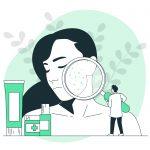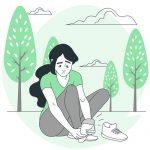
Starting Point
Depression is a serious and growing mental health condition that affects millions of women in the modern world, and it can have devastating effects on a woman’s mental, emotional, and physical well-being.
Women have been affected by depression since ancient times. It is an unfortunate reality that depression in women still exists today. Depression can cause many issues such as loss of productivity, feelings of sadness and hopelessness, and even suicidal thoughts.
The causes of depression in women can range from hormonal imbalances to environmental and social factors. Fortunately, there are a variety of treatments and preventative measures that can help women cope with depression.
Interesting Fact: Depression isn’t just a psychological disorder – it can also cause physical symptoms like fatigue, insomnia, and changes in appetite and weight. In some cases, depression can even lead to chronic pain and other medical conditions.
In This blog post we will explore the various causes of depression in women, discuss the available treatments, and provide helpful tips for prevention. We will also provide tips and advice to help women struggling with depression to manage their symptoms and find relief. So, whether you’re a woman struggling with depression, or you know someone who is, this blog is for you. We’ll be covering everything you need to know about depression in women, and we’ll be doing it in a way that’s both informative and fun. So, grab a cup of tea, sit back, and get ready to learn about one of the most common mental health issues facing women today.
What Is Depression?
Depression is a mood disorder that affects a person’s mental health and daily life. It’s a common condition that can affect anyone, but it’s more common in women than men. In fact, studies show that women are twice as likely to experience depression than men. Depression affects about 1 in 8 women at some point in their lives.
Depression is more than just feeling sad or blue. It’s a serious medical condition that can interfere with daily life, work, and relationships. Symptoms of depression may include feelings of hopelessness, sadness, loss of interest in activities, fatigue, changes in appetite and sleep patterns, difficulty concentrating, and thoughts of suicide.
Interesting Fact: Did you know that depression is one of the most common mental health disorders in the United States? It’s estimated that over 16 million American adults (and countless more worldwide) suffer from depression each year.
Depression is a treatable condition. With the right treatment, most people can overcome depression and improve their quality of life. If you or someone you know is experiencing symptoms of depression, it’s important to seek help from a healthcare professional.
The different types of depression
Depression is not a one-size-fits-all mental health disorder. In fact, there are several different types of depression that women may experience throughout their lifetime. Knowing the different types of depression can help women better understand their symptoms and seek the appropriate treatment. Here are the main types of depression:
1. Major Depressive Disorder (MDD)
This is the most common type of depression and is characterized by persistent feelings of sadness, hopelessness, and worthlessness that last for at least two weeks. Women with MDD may also experience physical symptoms, such as fatigue and sleep disturbances.
2. Persistent Depressive Disorder (PDD)
Also known as dysthymia, this type of depression is a chronic form of MDD that lasts for at least two years. Women with PDD may experience milder symptoms than those with MDD, but the symptoms are long-lasting and can impact their daily life.
3. Postpartum Depression (PPD)
PPD is a type of depression that occurs after childbirth and can affect up to 15% of new mothers. Women with PPD may experience feelings of sadness, guilt, and worthlessness, and may struggle to bond with their newborn.
4. Premenstrual Dysphoric Disorder (PMDD)
This is a type of depression that occurs in the days leading up to menstruation. Women with PMDD may experience mood swings, irritability, and physical symptoms such as bloating and headaches.
5. Seasonal Affective Disorder (SAD)
This type of depression is linked to the changing seasons and occurs in the fall and winter months. Women with SAD may experience symptoms such as low energy, oversleeping, and weight gain.
Treating each type of depression may require different approaches and medications. It’s important to consult with a healthcare professional to determine the best course of treatment. The key to treating and preventing depression in women is to seek help as soon as symptoms arise. Remember, depression is a treatable illness and seeking treatment is a sign of strength, not weakness.
Signs And Symptoms Of Depression
Depression is not just feeling sad or down in the dumps. It is a medical condition that affects a person’s physical and mental health. Recognizing the signs and symptoms of depression is important so that you can seek the right help and treatment. Here are the different types of signs and symptoms of depression that women may experience:
1. Persistent sadness or feelings of emptiness:
This is one of the most common symptoms of depression. You may feel like nothing is enjoyable anymore and struggle to find pleasure in the activities you used to love.
2. Changes in appetite:
Depression can cause you to lose or gain weight due to changes in appetite. You may lose interest in food or turn to comfort eating as a coping mechanism.
3. Sleep disturbances:
Depression can make it difficult to fall asleep, stay asleep or wake up feeling refreshed. You may experience insomnia or oversleeping.
4. Fatigue:
Feeling constantly tired or fatigued is a common symptom of depression. Even simple tasks can become a challenge.
5. Irritability or anger:
Depression can cause you to become irritable, easily frustrated, or even angry without any apparent reason.
6. Difficulty concentrating:
You may have trouble focusing or completing tasks due to a lack of energy and motivation.
7. Physical symptoms:
Depression can also cause physical symptoms such as headaches, stomach problems, and chronic pain.
If you’re experiencing any of these symptoms, it’s important to seek professional help. Depression in women can be treated effectively with the right treatment and support. Remember that you are not alone, and seeking help is always a sign of strength.
What Causes Depression In Women?
Depression in women can have several underlying causes, including biological, psychological, and environmental factors. Let’s take a closer look at some of the main causes:
1. Hormonal Changes:
Hormonal imbalances that occur during menstruation, pregnancy, postpartum, and menopause can trigger depression in women. According to a study, around 20-40% of women experience depression during menopause.
2. Genetics:
Depression may run in families, and research has shown that certain genetic variations can increase a woman’s risk of developing the condition.
3. Trauma:
Traumatic experiences such as abuse, neglect, or loss can have a lasting impact on a woman’s mental health and increase the likelihood of depression.
4. Chronic Illness:
Women with chronic conditions like cancer, diabetes, or autoimmune disorders are at a higher risk of developing depression.
5. Life Transitions:
Major life changes like divorce, retirement, or a move can lead to feelings of stress, isolation, and sadness, contributing to depression.
6. Social and Cultural Factors:
Gender inequality, discrimination, and social isolation are just a few of the social and cultural factors that can negatively impact a woman’s mental health.
It’s essential to understand the underlying cause of depression to provide effective treatment. How to treat depression in women involves a combination of medication, therapy, and lifestyle changes, including exercise, a healthy diet, and stress reduction techniques. If you’re experiencing depression symptoms, reach out to a mental health professional or support group for help.
How Can You Treat Depression?
Depression in women is a serious mental health issue that requires effective treatment. If you’re experiencing depression, there are various treatment options that you can consider. In this section, we’ll look at some of the ways you can treat depression in women.
Psychotherapy:
Psychotherapy is a common treatment option for depression in women. It involves talking to a therapist to help you understand and manage your emotions. Through psychotherapy, you can identify the root cause of your depression and learn how to cope with it. It is a proven treatment for depression, with studies showing that it is effective in reducing symptoms in 50-60% of patients.
Antidepressant medications:
Antidepressant medications can help to alleviate symptoms of depression. They work by altering the balance of chemicals in the brain that affect mood. There are various types of antidepressant medications available, including selective serotonin reuptake inhibitors (SSRIs) and serotonin and norepinephrine reuptake inhibitors (SNRIs). However, it’s important to consult a doctor before starting any medication to avoid side effects.
Physical exercise:
Physical exercise is another effective treatment option for depression in women. Exercise stimulates the release of endorphins, which are feel-good chemicals in the brain. Exercise can also improve sleep, reduce stress, and boost self-esteem. Research suggests that exercise can be as effective as medication in reducing symptoms of depression.
4. Mindfulness and Meditation:
Mindfulness and meditation are techniques that can help to calm the mind and reduce stress. Mindfulness involves being present and aware of your thoughts and feelings, while meditation involves focusing your attention on a specific object or thought. These practices can help to reduce symptoms of depression, with studies showing that they can be as effective as antidepressant medication.
5. Lifestyle Changes:
Making healthy lifestyle changes such as eating a balanced diet, getting enough sleep, and avoiding alcohol and drugs can also help to alleviate symptoms of depression. These changes can improve overall physical health and help to manage stress, which can contribute to depression.
It’s important to remember that treating depression in women is a journey, and what works for one person may not work for another. Seeking help from a healthcare provider and being open to different treatment options is crucial to overcoming depression.
How Can You Prevent Depression?
Depression can be a debilitating mental illness that affects both men and women, but studies have shown that women are twice as likely to suffer from it than men. It’s essential to note that depression is not a character flaw, and it’s not something that can be brushed off. Preventing depression requires taking positive steps towards good mental health. Here are some tips for preventing depression:
1. Practice Mindfulness:
Mindfulness can help prevent depression by allowing you to be more aware of your thoughts and feelings. This technique involves taking deep breaths and focusing on the present moment, rather than worrying about the past or future. Studies have shown that mindfulness can reduce symptoms of depression and anxiety.
2. Exercise Regularly:
Exercise releases endorphins, which are chemicals in your brain that promote happiness and positive emotions. Exercise also helps reduce stress levels and improve your overall health. Regular physical activity is also known to be effective in preventing depression.
3. Get Enough Sleep:
Getting enough sleep is crucial for maintaining good mental health. Lack of sleep can lead to mood swings, irritability, and depression. Aim for seven to eight hours of sleep each night.
4. Build Strong Social Connections:
Strong social connections with family and friends can be an effective way of preventing depression. Humans are social creatures, and being around others can help alleviate feelings of loneliness and isolation.
5. Practice Gratitude:
Practicing gratitude can help you focus on the positives in your life. Make a habit of writing down three things you are grateful for each day. It can help shift your mindset from negative to positive and prevent feelings of hopelessness.
6. Seek Help When You Need It:
Don’t be afraid to reach out to friends, family, or a mental health professional if you’re struggling with depression. Seeking help early on can prevent symptoms from getting worse.
Did you know that one in four women will experience depression at some point in their life? The good news is that depression can be treated, and it can also be prevented. Taking positive steps towards good mental health can make all the difference. So, make sure you take care of yourself, practice mindfulness, exercise regularly, get enough sleep, build strong social connections, practice gratitude, and seek help when you need it.
Interesting Facts About Depression
- Women are twice as likely to experience depression compared to men.
- Depression is the leading cause of disability worldwide.
- Depression affects more than 264 million people globally.
- The average age for the onset of depression is 32 years old.
- Depression can be caused by a variety of factors, including genetics, environment, and chemical imbalances in the brain.
- Women who experience depression during pregnancy are at a higher risk of postpartum depression.
- Depression is often co-occurring with other conditions, such as anxiety and substance abuse.
- People with depression have a higher risk of developing chronic diseases such as diabetes, heart disease, and stroke.
- Exercise has been shown to be as effective as medication in treating depression.
- Depression is a treatable condition, and seeking professional help can greatly improve the outcome.
Advice For Dealing With Depression
Depression is a challenging and often overwhelming experience, but it’s important to know that you don’t have to face it alone. If you or someone you know is struggling with depression, here are a few tips that may help:
1. Talk to someone you trust:
One of the most important things you can do when dealing with depression is to reach out and talk to someone. This could be a friend, family member, therapist, or support group. The act of sharing your thoughts and feelings with another person can help alleviate some of the emotional burden you may be carrying.
2. Practice self-care:
Self-care is a crucial part of managing depression. This includes things like eating well, getting enough sleep, and engaging in regular exercise. You might also consider taking up a relaxing hobby, like yoga or meditation, to help soothe your mind and body.
3. Seek professional help: While self-care can be helpful, sometimes you need additional support. If you are struggling with depression, it’s important to seek the help of a mental health professional. This might include a therapist, psychiatrist, or other mental health provider.
4. Take care of your physical health:
Depression can take a toll on your physical health as well as your mental health. Make sure to take care of your body by getting regular check-ups, eating a healthy diet, and avoiding unhealthy habits like smoking and excessive drinking.
5. Practice gratitude:
It can be hard to feel grateful when you are struggling with depression, but taking time each day to focus on the positive things in your life can help shift your mindset. Try keeping a gratitude journal or simply taking a few moments each day to reflect on what you are thankful for.
Remember, there is no one “right” way to deal with depression. What works for one person may not work for another. The important thing is to keep trying and seeking out the support and resources you need to help you navigate this challenging experience.
Consequences Of Ignoring Depression
Ignoring depression can have serious consequences for women. Here are some of the possible outcomes of untreated depression:
1. Chronic health problems:
One of the biggest consequences of ignoring depression is that it can lead to other health problems. Depression can weaken your immune system, leaving you more susceptible to infections and illnesses. It can also lead to physical symptoms such as chronic pain and fatigue. Additionally, depression can worsen existing health conditions, making it harder to manage other health problems.
Studies have shown that people with depression are more likely to suffer from chronic conditions such as diabetes, heart disease, and obesity. If depression goes untreated, these conditions can worsen over time.
2. Substance abuse:
Depression often leads people to self-medicate with drugs or alcohol. This can lead to addiction, which further exacerbates depression symptoms.
3. Relationship problems:
Women with untreated depression may struggle to maintain healthy relationships with friends, family members, and romantic partners. They may isolate themselves and withdraw from social activities, which can damage their relationships.
4. Work or school problems:
Depression can make it difficult to concentrate, stay motivated, and meet deadlines. Women with untreated depression may struggle to perform well in their jobs or in school.
5. Suicidal thoughts or actions:
Untreated depression can lead to thoughts of self-harm or suicide. It’s important to seek professional help if you are experiencing these symptoms.
6. Risk of other mental health disorders:
Ignoring depression can increase the risk of developing other mental health disorders, such as anxiety, personality disorders, or substance abuse disorders.
7. Worsening of symptoms:
Depression can be a significant risk factor for the worsening of symptoms over time. This can make it more difficult to manage the condition and may lead to more severe depression.
8. Financial difficulties:
Ignoring depression can lead to poor financial decision-making and difficulty managing money, which can result in financial hardship.
9. Legal problems:
Depression can cause impaired judgment and impulsive behavior, leading to legal problems.
10. Reduced quality of life:
Depression can negatively impact a person’s quality of life when ignored, making it more difficult to enjoy life and achieve personal goals.
Overall, it is essential to seek treatment for depression as soon as possible. Ignoring depression can have serious consequences, both for your physical health and your mental wellbeing. If you are experiencing symptoms of depression, reach out for help from a mental health professional. It’s never too late to get the support you need to feel better and improve your overall health.
FAQs
Q1: Can depression in women lead to suicide?
Answer: Unfortunately, yes. Suicide is one of the most serious and dangerous consequences of untreated depression in women. If you or someone you know is struggling with suicidal thoughts, seek help immediately.
Q2: Can hormonal changes cause depression in women?
Answer: Yes, hormonal changes such as those during pregnancy, postpartum, and menopause can cause depression in women. Hormonal imbalances can also trigger or exacerbate existing depression.
Are women more likely to experience depression than men?
Answer: Yes, women are twice as likely as men to experience depression. This may be due to a combination of biological, psychological, and societal factors.
Can lifestyle changes help prevent or manage depression in women?
Answer: Yes, making healthy lifestyle choices such as regular exercise, a balanced diet, sufficient sleep, and reducing stress can all help prevent or manage depression in women. Additionally, seeking therapy or counseling can also be effective.
Are there any natural remedies or supplements that can help with depression in women?
Answer: While some natural remedies and supplements such as St. John’s Wort and omega-3 fatty acids have been shown to have some effectiveness in treating mild depression, it is important to consult with a healthcare provider before trying any alternative treatments. Some natural remedies may interact with medications or have unwanted side effects.
Closure
Depression in women is a serious mental health condition that affects many individuals globally. While it is prevalent in women of all ages, it can be particularly concerning during significant life transitions, such as puberty, pregnancy, and menopause. The good news is that there is hope and support available for those who are struggling with depression.
It is important to seek help and to understand that depression is not a personal failure. There are various treatment options available, such as therapy, medication, and lifestyle changes. However, it is also important to take preventive measures, such as maintaining a healthy diet, getting enough sleep, and engaging in physical activity.
As a society, we must work towards removing the stigma around mental health and ensure that women receive the necessary care and support they require. By addressing the root causes of depression and creating a supportive environment, we can improve the overall well-being of women and create a brighter future.
If you are struggling with depression or know someone who is, seek help today. Remember, depression is treatable, and with the right support, you can regain control of your life and achieve happiness and fulfillment.



















